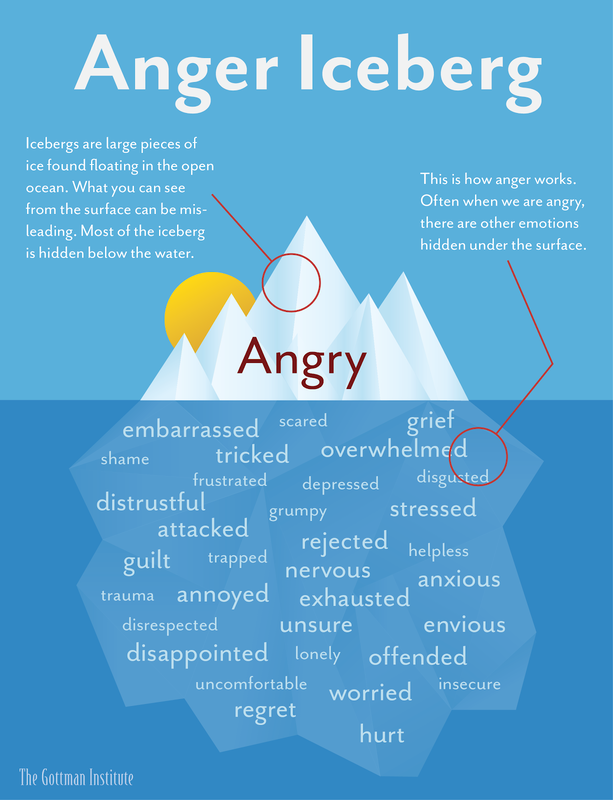|
It is very common that victims experience a lot of anger after being abused. They could be very angry towards God, the offender, service providers, family members, friends, the criminal justice system, or even themselves. It is ok to experience these emotions but is also necessary to be able to talk about them with a professional so they don’t last for a long time.
Anger is an emotion which has the primary intention of solving whatever problem or situation it is that we are facing. It gives us the energy and the strength to both motivate us and to allow us to face that problem in the hopes of resolving it. This is the purpose and general feeling of anger, but as said, the feelings of anger can vary from person to person. Anger can also be described as a “secondary emotion” because people tend to use it to protect other raw, vulnerable, overwhelming feelings. Below is the Anger Iceberg because it shows the “primary emotions” hidden below the surface. The Gottman Anger Iceberg helps us to understand this. (if you want to read more about this visit: https://www.gottman.com/blog/the-anger-iceberg/ |
What many people don’t realize is that anger is a secondary emotion. What does this mean? Typically, one of the primary emotions, like fear or sadness, can be found underneath the anger. Fear includes things like anxiety and worry, and sadness comes from the experience of loss, disappointment or discouragement. Beginning to identify the many emotions underneath anger is also a part of the healing process.
Uncertainty – when you lack ample information and things feel amorphous – can also trigger anger. Why? Because uncertainty touches upon the “unknown,” which tends to be scary for most people. Even boredom can generate anger or irritation because there can be a subtle sense of loss or fear associated with the experience of not engaging in something stimulating or productive. While having some “sense of control” is correlated with greater emotional wellbeing, excessive desire for control only leads to suffering, as it’s impossible to always be in control, especially of other people’s behavior. For Aristotle, the only way to positively harness the power of anger was to tame it with reason. |
Fort Refuge - Abuse survivors' community share these tips to deal with anger:
Write:
This basically means that you write the same phrase over and over, writing whatever comes to mind when you hear that phrase. The phrase for this particular patterning exercise is: "Anger is…"
Example:
Anger is scary.
Anger is white and blinding.
Anger is hitting things.
Anger is taking it out on someone else.
Anger is what I feel when I hurt myself.
Anger is when you can't fix something.
Anger is saying mean things to people.
Drawing:
In this exercise, all you have to do is think about the word "Anger" and draw/paint/sketch whatever comes to mind
Collage:
Similar to the drawing exercise, think of the word "Anger" and create whatever comes to mind.
http://www.fortrefuge.com/Dealing-With-Anger-As-A-Survivor.php



